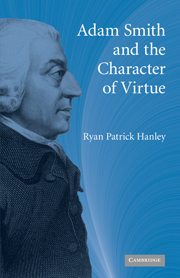Crossref Citations
This Book has been
cited by the following publications. This list is generated based on data provided by Crossref.
Lamb, Robert
2010.
Liberty, Equality, and the Boundaries of Ownership: Thomas Paine's Theory of Property Rights.
The Review of Politics,
Vol. 72,
Issue. 3,
p.
483.
Hanley, Ryan Patrick
2011.
Educational theory and the social vision of the Scottish Enlightenment.
Oxford Review of Education,
Vol. 37,
Issue. 5,
p.
587.
Herzog, Lisa
2011.
Higher and lower virtues in commercial society.
Politics, Philosophy & Economics,
Vol. 10,
Issue. 4,
p.
370.
McHugh, John W.
2011.
Relaxing a Tension in Adam Smith's Account of Sympathy.
Journal of Scottish Philosophy,
Vol. 9,
Issue. 2,
p.
189.
Wells, Thomas
and
Graafland, Johan
2012.
Adam Smith’s Bourgeois Virtues in Competition.
Business Ethics Quarterly,
Vol. 22,
Issue. 2,
p.
319.
Carrasco, Maria A.
2012.
Adam Smith: Self-Command, Practical Reason and Deontological Insights.
British Journal for the History of Philosophy,
Vol. 20,
Issue. 2,
p.
391.
MENZIES, GORDON
and
HAY, DONALD
2012.
Self and Neighbours*.
Economic Record,
Vol. 88,
Issue. s1,
p.
137.
Garrett, Aaron
2013.
The International Encyclopedia of Ethics.
Storr, Virgil Henry
2013.
The Impartial Spectator and the Moral Teachings of Markets.
SSRN Electronic Journal,
Herzog, Lisa
2013.
The Community of Commerce:.
Philosophy & Rhetoric,
Vol. 46,
Issue. 1,
p.
65.
Schliesser, Eric
2013.
Contemporary Perspectives on Early Modern Philosophy.
Vol. 29,
Issue. ,
p.
159.
Wells, Thomas
2013.
Handbook of the Philosophical Foundations of Business Ethics.
p.
281.
HANLEY, RYAN PATRICK
2014.
The “Wisdom of the State”: Adam Smith on China and Tartary.
American Political Science Review,
Vol. 108,
Issue. 2,
p.
371.
Fricke, Christel
2014.
The Challenges of Pride and Prejudice: Adam Smith and Jane Austen on Moral Education.
Revue internationale de philosophie,
Vol. n° 269,
Issue. 3,
p.
343.
Smith, Craig
2014.
Propriety and Prosperity.
p.
254.
Herzog, Lisa
2014.
Adam Smith on Markets and Justice.
Philosophy Compass,
Vol. 9,
Issue. 12,
p.
864.
Williams, David
2014.
Adam Smith and colonialism.
Journal of International Political Theory,
Vol. 10,
Issue. 3,
p.
283.
Carrasco, Maria A.
2014.
Adam Smith: Virtues and Universal Principles.
Revue internationale de philosophie,
Vol. n° 269,
Issue. 3,
p.
223.
Heath, Eugene
2014.
Propriety and Prosperity.
p.
169.
Mark, Garrett Longaker
2014.
Adam Smith on Rhetoric and Phronesis, Law and Economics.
Philosophy & Rhetoric,
Vol. 47,
Issue. 1,
p.
25.



